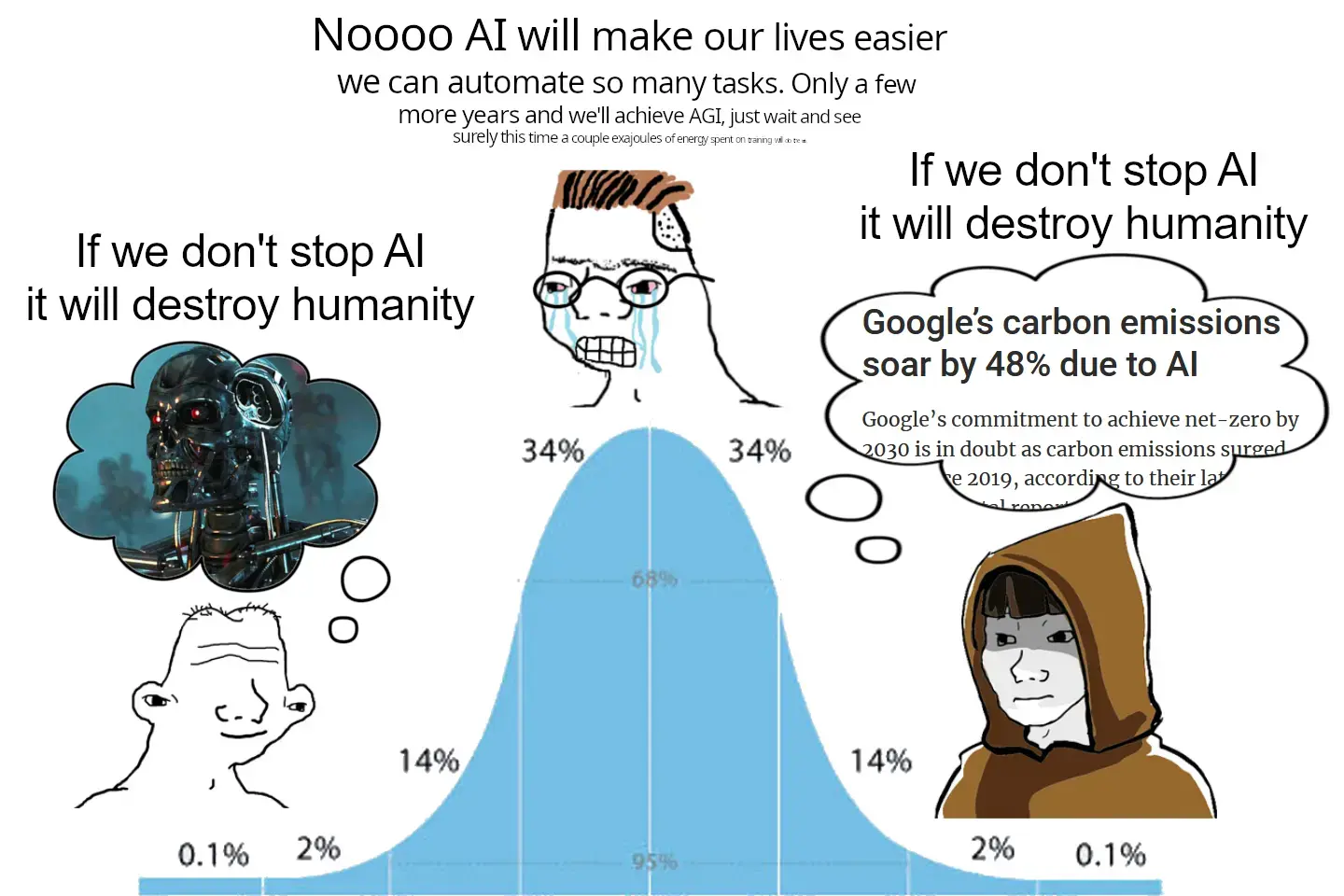this post was submitted on 05 Jul 2024
1097 points (95.3% liked)
Memes
50745 readers
376 users here now
Rules:
- Be civil and nice.
- Try not to excessively repost, as a rule of thumb, wait at least 2 months to do it if you have to.
founded 6 years ago
MODERATORS
you are viewing a single comment's thread
view the rest of the comments
view the rest of the comments

We definitely don't need AGI for AI technologies to be useful. AI, particularly reinforcement learning, is great for teaching robots to do complex tasks for example. LLMs have shocking ability relative to other approaches (if limited compared to humans) to generalize to "nearby but different, enough" tasks. And once they're trained (and possibly quantized), they (LLMs and reinforcement learning policies) don't require that much more power to implement compared to traditional algorithms. So IMO, the question should be "is it worthwhile to spend the energy to train X thing?" Unfortunately, the capitalists have been the ones answering that question because they can do so at our expense.
For a person without access to big computing resources (me lol), there's also the fact that transfer learning is possible for both LLMs and reinforcement learning. Easiest way to explain transfer learning is this: imagine that I want to learn Engineering, Physics, Chemistry, and Computer Science. What should I learn first so that each subject is easy for me to pick up? My answer would be Math. So in AI speak, if we spend a ton of energy to train an AI to do math and then fine-tune agents to do Physics, Engineering, etc., we can avoid training all the agents from scratch. Fine-tuning can typically be done on "normal" computers with FOSS tools.
IMO that can be an incredibly useful approach for solving problems whose dynamics are too complex to reasonably model, with the understanding that the obtained solution is a crude approximation to the underlying dynamics.
IMO I'm waiting for the bubble to burst so that AI can be just another tool in my engineering toolkit instead of the capitalists' newest plaything.
Sorry about the essay, but I really think that AI tools have a huge potential to make life better for us all, but obviously a much greater potential for capitalists to destroy us all so long as we don't understand these tools and use them against the powerful.
Since I don't feel like arguing, I will grant you that you are correct in what you say AI can do. I am not really but whatever, say it can:
How will these reasonable AI tools emerge out of this under capitalism? And how is it not all still just theft with extra steps that is imoral to use?
I'll try to keep this short then.
How does any technology ever see use outside of oppressive structures? By understanding it and putting to work on liberatory goals.
I think that crucial to working with AI is that, as it stands, the need for expensive hardware to train it makes it currently a centralizing technology. However, there are things we can do to combat that. For example, the AI Horde offers distributed computing for AI applications.
We gotta find datasets that are ethically collected. As a practitioner, that means not using data for training unless you are certain it wasn't stolen. To be completely honest, I am quite skeptical of the ethics of the datasets that the popular AI products were trained on. Hence why I refuse to use those products.
Personally, I'm a lot more interested in the applications to robotics and industrial automation than generating anime tiddies and building chat bots. Like I'm not looking to convince you that these tools are "intelligent", merely useful. In a similar vein, PID controllers are not "smart" at all, but they are the backbone of industrial automation. (Actually, a proven use for "AI" algorithms is to make an adaptive PID controller so that's it can respond to changes in the plant over time.)
These datasets do not exist, you got that right.
I highly doubt there is much AI deep learning needed to keep a robot arms PIDs accurate. That seems like something a regular old algorithm can do.
A deep neural adaptive PID controller would be a bit overkill for a simple robot arm, but for say a flexible-link robot arm it could prove useful. They can also work as part of the controller for systems governed by partial differential equations, like in fluid dynamics. They're also great for system identification, the results of which might indicate that the ultimate controller should be some "boring" algorithm.